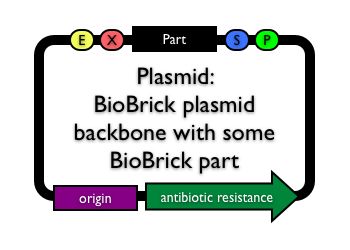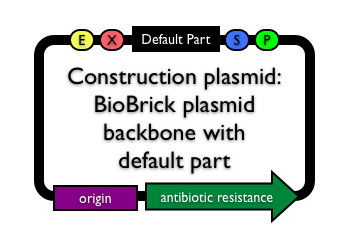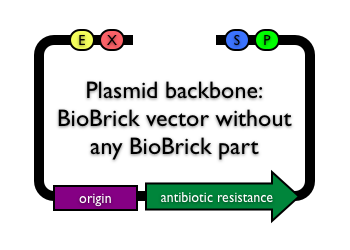Difference between revisions of "Help:Plasmid backbones/Glossary"
Smelissali (Talk | contribs) |
|||
| (36 intermediate revisions by 4 users not shown) | |||
| Line 1: | Line 1: | ||
| − | + | [[Help:Plasmid backbones|< Back to Plasmid backbone Help]] | |
| − | + | ||
| − | + | ||
| − | + | ||
| + | __notoc__ __NOEDITSECTION__ | ||
| + | Plasmids are circular, double-stranded DNA molecules typically containing a few thousand base pairs that replicate within the cell independently of the chromosomal DNA. Plasmids are a convenient way to propagate pieces of DNA, such as BioBrick standard biological parts. | ||
| − | + | The term "plasmid" can be a bit ambiguous. Here at the Registry, we use the term "plasmid" in three different ways: | |
| − | + | ||
| − | + | *"'''[[Help:Plasmid backbones/Glossary#Plasmid with any BioBrick part(s)|Plasmid with some BioBrick part(s)]]'''" - the vector WITH some BioBrick part(s). | |
| − | + | *"'''[[Help:Plasmid backbones/Glossary#Construction plasmid|Construction plasmid]]'''" - the vector WITH a default BioBrick part(s) or insert | |
| − | + | *"'''[[Help:Plasmid backbones/Glossary#Plasmid backbone|Plasmid backbone]]'''" - the vector alone, WITHOUT any BioBrick part | |
| − | + | For more detailed descriptions of each term, read on... | |
| − | + | ||
| − | + | ||
| − | + | ||
| − | + | {| | |
| + | |colspan=2| | ||
| + | ==Plasmid with some BioBrick part(s)== | ||
| + | |- | ||
| + | | [[Image:BioBrickvectorwithpart.png]] | ||
| + | | Every BioBrick® part available via the Registry is maintained on at least one BioBrick plasmid. Sometimes, a part is maintained on multiple BioBrick plasmid backbones, which vary in antibiotic resistance and replication origin (the replication origin controls the plasmid copy number). Thus, BioBrick parts are available from the Registry as plasmids. The BioBrick part is usually cloned between the BioBrick prefix (denoted by E and X, for EcoRI and XbaI) and the BioBrick suffix (denoted by S and P, for SpeI and PstI). | ||
| − | + | To refer to both a BioBrick part and the plasmid backbone that contains the part, the Registry uses the terminology '''pSB1A2-R0040'''. '''pSB1A2''' is the part number of the [[Help:Plasmids/Construction Plasmids#Plasmid backbone|plasmid backbone]] (see below) and '''R0040''' is the part number of BioBrick standard biological part [[Part:BBa_R0040|BBa_R0040]]. | |
| − | + | |- | |
| + | |colspan=2| | ||
| + | ==Construction plasmid== | ||
| + | |- | ||
| + | |[[Image:BioBrickconstructionplasmid.png]] | ||
| + | | Plasmids are used not only to maintain existing BioBrick standard biological parts but also as tools to make and propagate new BioBrick® standard biological parts as well as to assembly BioBrick parts together. Thus, you'll often want to obtain available BioBrick plasmid backbones from the Registry for use when building new BioBrick parts, devices and systems. For convenience, the Registry makes all BioBrick plasmid backbones available with one of a set of default parts. The default parts each have a regular BioBrick part number and Registry entry documenting their sequence and function. Plasmids that consist of a plasmid backbone and default part between the BioBrick® prefix and suffix are called '''"construction plasmids"'''. | ||
| − | ==Plasmid | + | For an overview of construction plasmids and the default parts contained in construction plasmids, see [[Help:Plasmids/Construction plasmids]]. |
| − | [[Image: | + | |- |
| − | + | |colspan=2| | |
| + | ==Plasmid backbone== | ||
| + | |- | ||
| + | |[[Image:BioBrickvectorbackbone.png]] | ||
| + | | Plasmids essentially serve as containers for BioBrick parts. Thus, it is helpful to distinguish between the part itself and container of the part. The term '''"plasmid backbone"''' refers to only the vector or "backbone" of the BioBrick part that it propagates. The plasmid backbone includes the BioBrick prefix and suffix, but not any of the part sequence. | ||
| − | + | [[Part:pSB1A3|pSB1A3]], [[Part:pSB3K3|pSB3K3]], and [[Part:BBa_J52017|BBa_J52017]] are all examples of plasmid backbones. These plasmid backbones each have an entry in the Registry, just as a normal BioBrick part does. To find the Registry page of a particular plasmid backbone, enter the [[Help:Plasmids/Nomenclature|plasmid part name]] (e.g., pSB4K5 or pSB3K3 or pSB1AC3) in the text box at the top right corner of the page and click "Go". | |
| − | + | |} | |
| − | + | ||
| − | + | ||
Latest revision as of 18:48, 10 December 2008
< Back to Plasmid backbone Help
Plasmids are circular, double-stranded DNA molecules typically containing a few thousand base pairs that replicate within the cell independently of the chromosomal DNA. Plasmids are a convenient way to propagate pieces of DNA, such as BioBrick standard biological parts.
The term "plasmid" can be a bit ambiguous. Here at the Registry, we use the term "plasmid" in three different ways:
- "Plasmid with some BioBrick part(s)" - the vector WITH some BioBrick part(s).
- "Construction plasmid" - the vector WITH a default BioBrick part(s) or insert
- "Plasmid backbone" - the vector alone, WITHOUT any BioBrick part
For more detailed descriptions of each term, read on...
Plasmid with some BioBrick part(s) | |

|
Every BioBrick® part available via the Registry is maintained on at least one BioBrick plasmid. Sometimes, a part is maintained on multiple BioBrick plasmid backbones, which vary in antibiotic resistance and replication origin (the replication origin controls the plasmid copy number). Thus, BioBrick parts are available from the Registry as plasmids. The BioBrick part is usually cloned between the BioBrick prefix (denoted by E and X, for EcoRI and XbaI) and the BioBrick suffix (denoted by S and P, for SpeI and PstI).
To refer to both a BioBrick part and the plasmid backbone that contains the part, the Registry uses the terminology pSB1A2-R0040. pSB1A2 is the part number of the plasmid backbone (see below) and R0040 is the part number of BioBrick standard biological part BBa_R0040. |
Construction plasmid | |

|
Plasmids are used not only to maintain existing BioBrick standard biological parts but also as tools to make and propagate new BioBrick® standard biological parts as well as to assembly BioBrick parts together. Thus, you'll often want to obtain available BioBrick plasmid backbones from the Registry for use when building new BioBrick parts, devices and systems. For convenience, the Registry makes all BioBrick plasmid backbones available with one of a set of default parts. The default parts each have a regular BioBrick part number and Registry entry documenting their sequence and function. Plasmids that consist of a plasmid backbone and default part between the BioBrick® prefix and suffix are called "construction plasmids".
For an overview of construction plasmids and the default parts contained in construction plasmids, see Help:Plasmids/Construction plasmids. |
Plasmid backbone | |

|
Plasmids essentially serve as containers for BioBrick parts. Thus, it is helpful to distinguish between the part itself and container of the part. The term "plasmid backbone" refers to only the vector or "backbone" of the BioBrick part that it propagates. The plasmid backbone includes the BioBrick prefix and suffix, but not any of the part sequence.
pSB1A3, pSB3K3, and BBa_J52017 are all examples of plasmid backbones. These plasmid backbones each have an entry in the Registry, just as a normal BioBrick part does. To find the Registry page of a particular plasmid backbone, enter the plasmid part name (e.g., pSB4K5 or pSB3K3 or pSB1AC3) in the text box at the top right corner of the page and click "Go". |
